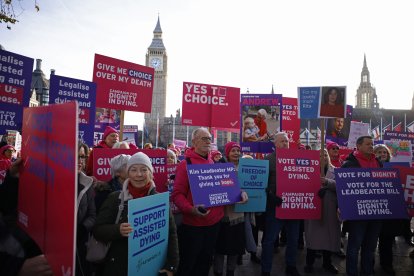UK moves toward assisted dying in a parliamentary vote that divides the country
A majority of M.P.s voted in favor of a bill that would allow terminally ill adult patients to ask the state for help to end their lives.

Activists in favor of assisted dying
After a heated five-hour debate, the British House of Commons approved a bill to legalize assisted dying in England and Wales. The initiative, which must still pass through other legislative bodies, divided the country, with citizens taking to the streets, social media and sending letters to their representatives.
The Terminally Ill Adults (End of Life) bill allows adults with a terminal illness and with only six months of life expectancy to request assisted suicide. To do so, they require the approval of two physicians and a judge. If the necessary permission is received, a medical professional delivers an "an approved substance with which the person may end their own life."
Its approval was unknown until the time of the voting tally: 275 against, 330 in favor. Party alignments broke down, with Labour and Conservatives voting for or against according to their own personal beliefs. Prime Minister Keir Starmer kept his preference secret and asked his own to be neutral before the vote. He eventually voted in favor. His cabinet was split, with 15 yes votes and eight no votes.
Among the latter was Health Minister Wes Streeting, who had expressed concern about the financial burden it would mean for a public system in crisis. Also voting against it was his party colleague Saqib Bhatti, claiming it could be a "slippery slope" that places "an undue burden on our health professionals" and "legitimi[z]ing a role for the state in the death process."
"The right to choose doesn’t take away the right not to choose," Labour's Kim Leadbeater, who introduced the bill, argued during the debate. "Giving the choice to an assisted death to those who want it would of course not stop anyone who is not terminally ill from choosing not to do so." Leadbeater defends assisted suicide as a measure in favor of the right to choose over one's own body.
Other M.P.s complained about not having the opportunity to speak out before the vote, such as Labour's Rosie Duffield: "After 7.5 years in the House, I did not get to speak, on behalf of all those who've written, for even 3 minutes, on one of the most important and contested Private Members' Bills we've had... Proof that this is NOT the way for us to legislate on these matters."
The fight continues
The outcome of the vote sparked celebration and despair among activist groups gathered outside the British Parliament. "Today is indeed a very Black Friday for the vulnerable in this country, but this is not over," said the executive director of the NGO Christian Concern, Andrea Williams.
After passing in this vote, the text will be examined by a committee and then submitted again for a vote in both parliamentary chambers, the Commons and the Lords.
"The proposed safeguards are completely meaningless, and more and more MPs are waking up to that reality. This Bill will create more suffering and chaos in the NHS, not less, and if it goes through, the vulnerable will become more vulnerable," said Williams, echoing the argument that people with disabilities or few resources will be disproportionately pushed into assisted dying.
"Let's keep fighting," Dr. Calum Miller, a vocal critic of the bill, also said. "It is absolutely insane, and wicked, for the government to fund state-assisted death... When they are still yet to seriously fund state-assisted life."
Access the full bill
RECOMMENDATION





















